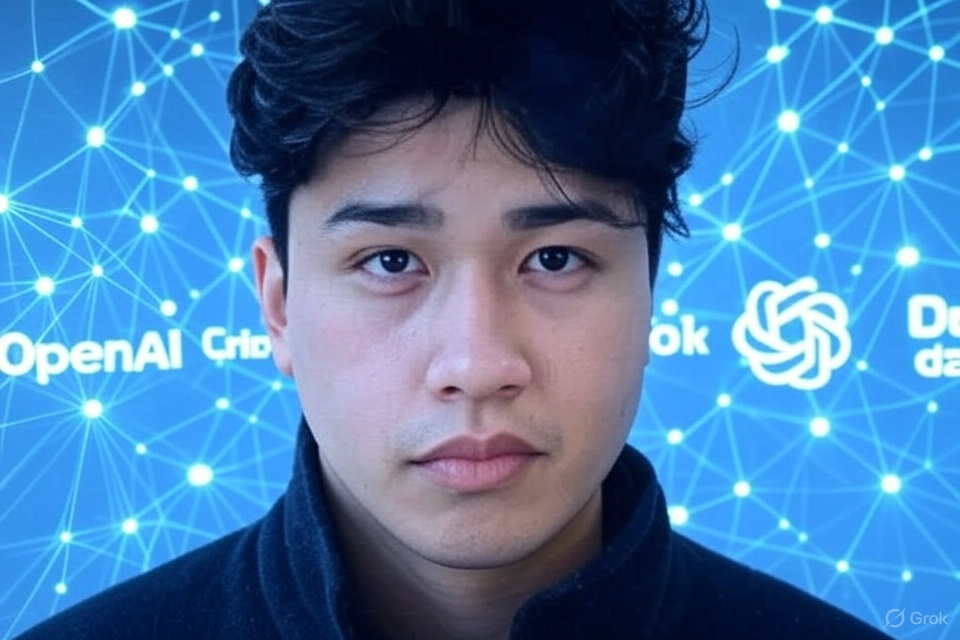
This 22 Year Old Just Outscored Every AI
Most AI systems give you multiple choice answers. Joseph Reth's AI does something completely different.
It investigates.
While ChatGPT, Grok, and Claude present options, Reth's Aristotle X1 Verify checks its own answers and develops further investigation. The difference between guessing and actually knowing just shifted the entire competitive landscape.
The Numbers Tell the Story
I watched the benchmark results come in. Aristotle X1 Verify scored 92.4% on GPQA Diamond testing.
Grok 4 Heavy managed 88.9%. Claude Sonnet 4 hit 78.2%. The gap isn't small.
What makes this remarkable is the person behind it. Joseph Reth's journey began earlier than most realize. At 14, he was already attending Modesto Junior College for Computer Science while his peers were in high school.
By 16, he founded RethDigital, which became one of the fastest-growing digital agencies in the United States. His client roster reads like a media powerhouse: HBO, Comedy Central, Whole Foods, Hyundai, and Verizon.
But the real breakthrough came when Reth started training autoregressive models after GPT-Neo's 2021 release. His work has since reached millions globally and been implemented in U.S. Department of Defense systems.
Now at 22, he's outscoring every major AI company. His research has even contributed to establishing consciousness research as an empirical scientific discipline.
The Science Behind the Breakthrough
Reth's work isn't happening in isolation. He co-founded Autopoiesis Sciences with backing from scientists at Harvard, Oxford, and DeepMind.
The company recently secured funding led by Informed Ventures, a Menlo Park-based firm specializing in transformative AI applications. Their investor thesis is bold: "Scientific superintelligence has the potential to turbocharge scientific discovery in a way not seen since the discovery of the scientific method."
Co-founder Eike Gerhardt, who met Reth and distinguished ex-FDA chemist Larry Callahan, believes "Autopoiesis Sciences might become the most impactful company ever built."
Self-Verification Changes Everything
The breakthrough isn't just performance. It's methodology.
Traditional AI systems suffer from a critical flaw: poor calibration. Most AI models might be 90% confident in an answer that turns out correct only 70% of the time. They hallucinate with confidence. Reth's team solved this by embedding systematic doubt into every layer of reasoning. Their training methodology teaches models when to be confident and when to acknowledge limitations. The result? Reth's autopoietic approach eliminates hallucinations by cross-checking actual data instead of generating additional hypotheses.
The Right answers make all the difference. Especially in medicine, where a hallucination could be deadly.
I believe this technology will revolutionize medical discoveries, infrastructure planning, and energy systems. When AI can reason at lightspeed with all global data consumed and analyzed at quantum level, we're looking at a health revolution.
Who This Really Serves
This breakthrough doesn't target casual users asking for recipes or diet advice.
It serves hardcore analytical users. Researchers doing complex problem-solving. Scientists working on drug interactions, DNA sequencing, surgical procedures. People who need AI that actually reasons instead of pattern matching.
The difference becomes obvious when you need to find root causes and develop new treatments. Current AI gives you possibilities. Reth's system investigates until it finds answers.
The Competitive Arms Race
This won't end the dominance of current AI giants. But it requires a bigger stage for everyone to compete.
We're entering an arms race that should lead to better outcomes through competition. Companies will try to copy, emulate, and outpace each other.
But here's what most people in tech are missing: If Reth's system truly self-improves and self-creates, it could evolve faster than competitors can replicate it.
At some level, if it takes on a life of its own, it will fight against copycats as a means of survival.
Vision of the Future
The key insight that most technologists are missing is the difference between having a "vision for the future" versus seeing the "vision of the future."
Reth isn't trying to build his preferred future. He's recognizing what's already emerging.
When AI systems can verify their own reasoning and investigate deeper instead of just presenting options, we cross a threshold. The question isn't whether this approach will dominate.
The question is how quickly everyone else adapts to compete.
What Happens Next
Every breakthrough creates two camps: those who see it coming and those who scramble to catch up.
Right now, while tech giants pour billions into incremental improvements, a 22-year-old has quietly solved the fundamental problem that makes AI unreliable. His system doesn't just perform better. It thinks differently.
The companies that recognize this shift early will build on solid ground. The ones that don't will find themselves trying to patch hallucinations while competing against systems that eliminated them entirely.
The race isn't just starting. For those paying attention, it's already being won.
So here's what I want to know: If a 22-year-old can outthink billion-dollar AI labs, what does that say about how we've been approaching intelligence itself? And if his system can evolve faster than competitors can copy it, are we watching the birth of something that will make today's AI wars look like children arguing over toys?
More importantly, when this technology reaches your industry, will you be ready to use AI that actually knows when it's wrong, or will you still be double-checking answers from systems that hallucinate with confidence?
Tags: #ArtificialIntelligence #AIBreakthrough #TechInnovation #MachineLearning #AIResearch #TechDisruption #AICompetition #YoungEntrepreneur #AIFuture #TechStartup
